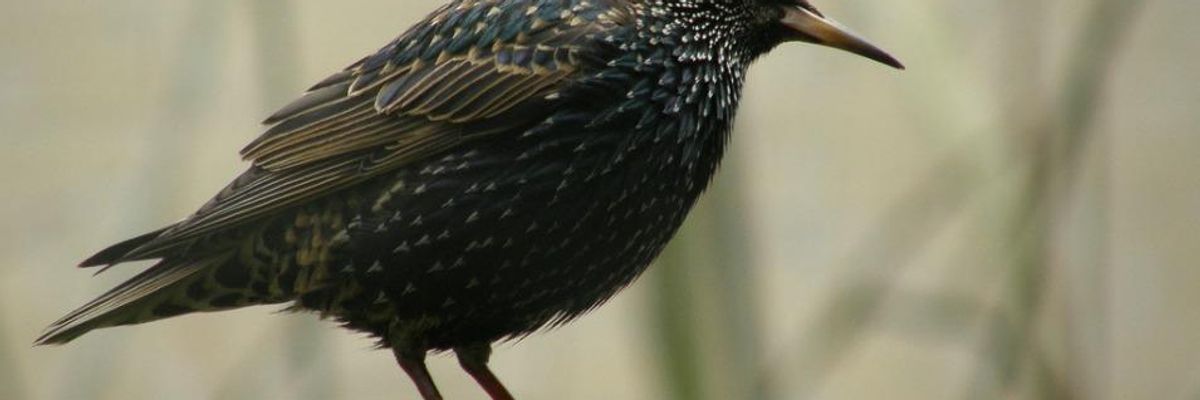
A European starling takes a look at things from its perch in the Netherlands. (Photo: Bas Kers (NL)/cc/flickr)
To donate by check, phone, or other method, see our More Ways to Give page.

A European starling takes a look at things from its perch in the Netherlands. (Photo: Bas Kers (NL)/cc/flickr)
A class of insecticides linked to the decline of bees may be even more ecologically damaging than previously thought, possibly causing declines in birds as well.
The new findings by researchers from the Netherlands were published Wednesday in the journal Nature.
The researchers looked at one neonicotinoid or "neonic" called imidacloprid, and found that where the concentrations of that insecticide were more than 20 nanograms per liter, bird populations dropped by 3.5 per cent on average annually.
"In ten years it's a 35% reduction in the local population, it's really huge," study co-author Hans de Kroon from Radboud University told BBC News. "It means the alarm bells are on straight away."
The scientists suspect that the imidacloprid builds up and can persist for years in the soil, killing insects that the birds depend on for food, therefore leading to their decline.
"Our results suggest that the impact of neonicotinoids on the natural environment is even more substantial than has recently been reported and is reminiscent of the effects of persistent insecticides in the past," the study reads.
The new study comes on the heels of an analysis by a global team of scientists which found "clear evidence" that neonics--the most widely used insecticides in the world--pose threats to bees, other pollinators, earthworms and ecosystems across the globe.
"Our study really makes the evidence complete that something is going on here," de Kroon told the Guardian. "We can't go on like this any more. It has to stop."
________________________
Trump and Musk are on an unconstitutional rampage, aiming for virtually every corner of the federal government. These two right-wing billionaires are targeting nurses, scientists, teachers, daycare providers, judges, veterans, air traffic controllers, and nuclear safety inspectors. No one is safe. The food stamps program, Social Security, Medicare, and Medicaid are next. It’s an unprecedented disaster and a five-alarm fire, but there will be a reckoning. The people did not vote for this. The American people do not want this dystopian hellscape that hides behind claims of “efficiency.” Still, in reality, it is all a giveaway to corporate interests and the libertarian dreams of far-right oligarchs like Musk. Common Dreams is playing a vital role by reporting day and night on this orgy of corruption and greed, as well as what everyday people can do to organize and fight back. As a people-powered nonprofit news outlet, we cover issues the corporate media never will, but we can only continue with our readers’ support. |
A class of insecticides linked to the decline of bees may be even more ecologically damaging than previously thought, possibly causing declines in birds as well.
The new findings by researchers from the Netherlands were published Wednesday in the journal Nature.
The researchers looked at one neonicotinoid or "neonic" called imidacloprid, and found that where the concentrations of that insecticide were more than 20 nanograms per liter, bird populations dropped by 3.5 per cent on average annually.
"In ten years it's a 35% reduction in the local population, it's really huge," study co-author Hans de Kroon from Radboud University told BBC News. "It means the alarm bells are on straight away."
The scientists suspect that the imidacloprid builds up and can persist for years in the soil, killing insects that the birds depend on for food, therefore leading to their decline.
"Our results suggest that the impact of neonicotinoids on the natural environment is even more substantial than has recently been reported and is reminiscent of the effects of persistent insecticides in the past," the study reads.
The new study comes on the heels of an analysis by a global team of scientists which found "clear evidence" that neonics--the most widely used insecticides in the world--pose threats to bees, other pollinators, earthworms and ecosystems across the globe.
"Our study really makes the evidence complete that something is going on here," de Kroon told the Guardian. "We can't go on like this any more. It has to stop."
________________________
A class of insecticides linked to the decline of bees may be even more ecologically damaging than previously thought, possibly causing declines in birds as well.
The new findings by researchers from the Netherlands were published Wednesday in the journal Nature.
The researchers looked at one neonicotinoid or "neonic" called imidacloprid, and found that where the concentrations of that insecticide were more than 20 nanograms per liter, bird populations dropped by 3.5 per cent on average annually.
"In ten years it's a 35% reduction in the local population, it's really huge," study co-author Hans de Kroon from Radboud University told BBC News. "It means the alarm bells are on straight away."
The scientists suspect that the imidacloprid builds up and can persist for years in the soil, killing insects that the birds depend on for food, therefore leading to their decline.
"Our results suggest that the impact of neonicotinoids on the natural environment is even more substantial than has recently been reported and is reminiscent of the effects of persistent insecticides in the past," the study reads.
The new study comes on the heels of an analysis by a global team of scientists which found "clear evidence" that neonics--the most widely used insecticides in the world--pose threats to bees, other pollinators, earthworms and ecosystems across the globe.
"Our study really makes the evidence complete that something is going on here," de Kroon told the Guardian. "We can't go on like this any more. It has to stop."
________________________